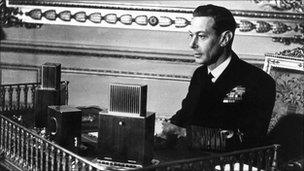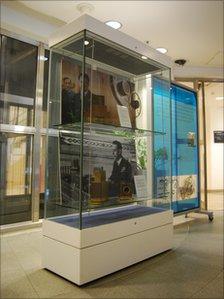Broadcasting with the King's microphone
- Published

King George VI making the Christmas Day broadcast in 1944
Can a 74-year-old microphone last spoken into by King George VI still be used to broadcast live to the nation? Paddy O'Connell, presenter of Radio 4's Broadcasting House, thought it might be worth a try.
There's a small display case by the stairs in BBC Television Centre. People working there and visitors on tours of the building walk past it every day.
Each week, thousands of people may glimpse behind the glass something that has helped make history on the airwaves. Two weeks ago, a cluster of microphones appeared there.
For years, the grand ceremonial microphones used by monarchs to address their subjects have lived in silence down in the basement, but to mark the success of the film The King's Speech, the wood and brass boxes were given an outing.
When I joined the hundreds walking past the display case, I was very much taken by the microphone on which King George VI gave his coronation speech on BBC Radio in 1937. I said to my colleagues: "Can we take it out of there and plug it in?"
The man to consider my request was Rory O'Connell - the collections manager of BBC Heritage.
In his subterranean storeroom, Rory showed me a bust of Kate Adie and allowed me to clatter on the keys of Alistair Cooke's portable typewriter, a "Quiet Deluxe".
Then he opened a filing cabinet, revealing his full collection of what looked like small wooden models of The Cenotaph.
Inside the imposing boxes are fairly standard microphones, so why the fancy carpentry? Rory explained the camouflage.
"The tradition of having a dedicated microphone for royal broadcasts seems to have started in a quite informal way, when the BBC engineer thought the King shouldn't have to look at something as crude as an ordinary BBC microphone, so draped a piece of regal blue cloth over it to disguise it. And down the years the disguises became more and more elaborate."
An 'A-Type'
I wasn't the first person to go into the bowels of the BBC to see these mics.
The makers of the film The King's Speech visited Rory to pick his brains and carefully study the microphones so as to make the props that appear in the movie as accurate as possible.
So to the important question. Could I take a microphone not used since King George VI sat behind it in 1937, and broadcast live with it on BBC Radio 4?
The BBC's Royal microphone
"Er. I don't see why not?" was Rory's reply. "Don't drop it."
The technical wizards who operate the Radio 4 studio - apart from being hugely excited about getting their hands some kit from the 1930s, an "A-type" - seemed fairly confident that the microphone would still work.
What was state-of-the-art before the war isn't all that different from the microphone I, Eddie Mair and John Humphrys use today.
With 30 minutes to go to the programme, a buzz could be heard from the King's mic.
I was told to expect something fuzzy, but if the connections held out, listeners would be able to hear our guest.
To use the mic we'd invited along one of those who took speech therapy classes from Lionel Logue, whose methods helped King George VI to overcome his stammer and speak to his subjects.

The microphones in their display case
Nicholas Mosley was the son of the British fascist leader Oswald Mosley. Just as he rejected his father's politics, he shared none of his proven abilities at oratory.
"I started to stammer as a young boy, the typical age, and Lionel Logue taught me to speak in a sing-song style."
As I listened to him explain his story into the 74-year-old mic, it was clear as a bell.
With his words I had the answer to my question. Can a famous microphone work after seven decades in a drawer? Yes it can, just listen.
So how did the audience at home judge its performance? On Twitter, Vivs wrote that listening to Nicholas Mosley was a highlight of her morning, and Paul Infield called it "excellent."
I could hear no annoying fuzz or interference at all as the interview went along, just as we'd hoped.
But something dawned on me though, as I listened on. If there is a faint hum coming from its system of magnetic coil and cables, is that an echo of history, or is it all in the mind?
- Published26 February 2011
- Published6 January 2011